
|
Astronomy Picture Of the Day (APOD)
 Mt Etna Lava Plumes
Mt Etna Lava Plumes
31.03.2003
Mt. Etna has been erupting for hundreds of thousands of years. Located in Sicily, Italy, the volcano produces lava fountains over one kilometer high. Mt. Etna is not only one of the most active...
 Beijing Ancient Observatory
Beijing Ancient Observatory
30.03.2003
Did observatories exist before telescopes? One example that still stands today is the Beijing Ancient Observatory in China. Starting in the 1400s astronomers erected large instruments here to enable them to measure star and planet positions with increasing accuracy.
 The Shadow of Phobos
The Shadow of Phobos
29.03.2003
Hurtling through space above the Red Planet, potato-shaped Phobos completes an orbit of Mars in less than eight hours. In fact, since its orbital period is shorter than the planet's rotation period, Mars-based...
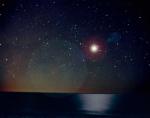 1006 AD: Supernova in the Sky
1006 AD: Supernova in the Sky
28.03.2003
A new star, likely the brightest supernova in recorded human history, appeared in planet Earth's sky in the year 1006 AD. The expanding debris cloud from the stellar explosion is still visible to modern astronomers, but what did the supernova look like in 1006?
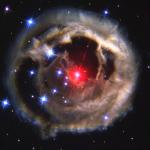 Light Echoes from V838 Mon
Light Echoes from V838 Mon
27.03.2003
Nominated for most mysterious star in the Milky Way, V838 Monocerotis briefly became one of the brightest stars in our galaxy. Its outburst discovered in January 2002, observations have indicated that V838 Mon somehow...
 A Lenticular Cloud Over Wyoming
A Lenticular Cloud Over Wyoming
26.03.2003
Is that a cloud or a flying saucer? Both, although it is surely not an alien spacecraft. Lenticular clouds can be shaped like a saucer, and can fly in the sense that, like most clouds, they are composed of small water droplets that float on air.
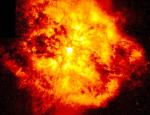 A Slow Explosion
A Slow Explosion
25.03.2003
Why would a gamma ray burst fade so slowly? This behavior, recorded last October, is considered a new clue into the cause of gamma-ray bursts, the most powerful explosions known in the universe.
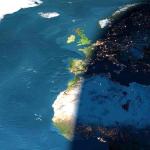 A Digital Sunset Over Europe and Africa
A Digital Sunset Over Europe and Africa
24.03.2003
No single spacecraft or astronaut took this picture. It is a digital composite of archived images taken over many orbits by several Earth-orbiting satellites. Similar images can be digitally stitched together for any Earth location by John Walker's Earth and Moon Viewer website.
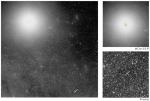 Alpha Centauri: The Closest Star System
Alpha Centauri: The Closest Star System
23.03.2003
The closest star system to the Sun is the Alpha Centauri system. Of the three stars in the system, the dimmest -- called Proxima Centauri -- is actually the nearest star. The bright stars Alpha Centauri...
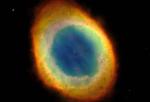 M57: The Ring Nebula
M57: The Ring Nebula
22.03.2003
Except for the rings of Saturn, the Ring Nebula (M57) is probably the most famous celestial band. This planetary nebula's simple, graceful appearance is thought to be due to perspective -- our view from planet Earth looking straight into what is actually a barrel-shaped cloud of gas shrugged off by a dying central star.
|
January February March April May June July August September October November December |
||||||||||||||||||||||||||||||||||||||||||||||||||||||||